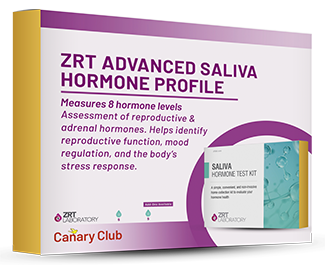If you have recently gone through a major event in your life, your adrenal glands may be severely fatigued.
While this is not a new condition, the onset of adrenal fatigue often occurs because of major stressors such as financial pressures, emotional stress, smoking, drugs, poor eating habits, high intake of sugar and white flour products, and infections.

After experiencing many of these events over a long period of time, the adrenal glands tend to produce less cortisol, the body's master stress hormone. Cortisol’s main function in the body is to enable the body to handle stress and maintain the immune system, The struggle of the adrenal glands to meet cortisol production is what eventually leads to adrenal fatigue.
You might be experiencing some common symptoms of adrenal fatigue:
Morning fatigue -- You don't really seem to "wake up" until 10 a.m., even if you've been awake since 7 a.m.
- Afternoon "low" (feelings of sleepiness or clouded thinking) from 2 to 4 p.m.
- Burst of energy at 6 p.m.-- You finally feel better from your afternoon lull.
- Sleepiness at 9 to 10 p.m.-- However, you resist going to sleep.
- "Second wind" at 11 p.m. that lasts until about 1 a.m., when you finally fall asleep.
- Cravings for foods high in salt and fat
- Mild depression
- Decreased ability to handle stress
- Increased allergies
- Lightheadedness when getting up from a sitting or laying down position
- Decreased sex drive
- Frequent sighing
Adrenal Fatigue and Health Practitioners
These days alternative health practitioners are beginning to recognize the extensive condition of adrenal fatigue, also known as hyponatremia. In mainstream medicine, doctors are hard-pressed to diagnose adrenal fatigue unless patients meet the criteria for Addison’s disease (extremely little adrenal function) or Cushing's disease (hyper adrenal).
What To Do?
Saliva testing is the most accurate way to find your cortisol and adrenal levels. Saliva cortisol testing usually includes the sex hormones and is the most accurate test because it shows the rhythm of cortisol production and how much cortisol is present that the body can actually use. Blood tests only show bound cortisol which gives no indication if that cortisol is actually available to enter the tissues. Canary Club offers the AdvancedPlus Hormone Panel which tests thyroid, adrenal, and reproductive levels.
A more in-depth picture of adrenal fatigue (even overlooked at times, by integrative practitioners):
Asthma, bronchitis, or a chronic cough: People with lung problems, especially asthma and bronchitis should be checked for low adrenal function. The lungs cannot respond appropriately to stress, allergens, etc because of lack of cortisol. Asthma is often considered an emotional disease because stress can trigger an attack. Treat the adrenals properly so the body can respond normally to stress and the asthma symptoms can lessen. and the condition will be much improved.
Allergies: As the adrenal function decreases, allergies tend to worsen. Generally, if the adrenal glands are functioning properly, the body would not respond to the allergen. This same anti-inflammatory effect is important in asthma as well. As the adrenal glands heal, allergies are markedly reduced.
Chronic infections: Severe and/or recurrent infections (especially respiratory) often indicate adrenal problems. The more severe, the more frequently it occurs or the longer it lasts, the more likely adrenal fatigue is involved.
Muscle weakness and back pain: When the adrenal glands are malfunctioning, there tends to be a weakness in one or more muscles leading to low back pain. In persons with adrenal fatigue, low back pain is frequently caused by instability of the pelvis rather than an actual back problem. These same two muscles also attach to the knee and help provide support. Weakness will cause knee pain, weakness, and instability of the joint. Any person with knee problems should be checked for adrenal fatigue. The other 3 muscles mentioned stabilizing the feet and ankles. The weakness of any of these muscles leads to complaints of tired, aching feet, weak ankles or aching calves. The symptoms related to muscle weakness will improve when the adrenal glands are treated.
Sleep disturbances: Cortisol production follows a curve from the highest levels around 8 am, dropping throughout the day until the lowest levels are reached at about 11 pm. In the early stages of adrenal fatigue, the body compensates for high nighttime cortisol. In this case, the person finds it difficult to relax from the stress of the day and has trouble going to sleep. High night-time cortisol results in reduced REM sleep which is neither restful nor restorative. This can lead to depression and reduced energy levels the next day. In the later stages of adrenal fatigue, the body may produce adrenaline ("fight or flight" hormone) in an attempt to compensate for low cortisol.
Dizziness: When a person stands from a sitting or lying position, the systolic blood pressure usually rises about 10 points as blood vessels in the lower body constrict to force blood to the heart, lungs, and brain. This is a result of the action of epinephrine on the blood vessels. In people with adrenal fatigue, the blood vessels are unable to respond to the release of epinephrine(adrenaline) because of a lack of cortisol, so blood pools in the abdomen and pelvis and blood pressure drops. This systolic drop ranges from 10 to 40 points and is present in over 90% of those with hypoadrenia. Dizziness is usually present on standing; however, in some people, it is present intermittently or constantly throughout the day as even resting blood pressure is low. Paradoxically, in order to prevent the pooling of blood in the abdomen and lower extremities, the body may keep blood pressure extremely elevated. Pressure will still drop when the person stands but only to around 150. Remember, it may have been 180 or higher before standing. Treating the adrenals will lower blood pressure whereas anti-hypertensives and diuretics will make the adrenal problems worse in many cases.
Inflammation: Cortisol produced by the adrenal glands are the body's own anti-inflammatory hormones. People who have responded to injections of corticosteroids into joints or to taking them orally are usually those whose adrenal glands produce insufficient amounts of these hormones. Any person who responds to corticosteroids should be checked for adrenal fatigue.
Hypoglycemia: As adrenal fatigue progresses, blood glucose levels will tend to fall too low. The body responds to hypoglycemia by causing the person to crave anything that will rapidly raise blood sugar levels. Often adrenal fatigue leads to the abuse of alcohol, marijuana, and hard drugs because of the need to "fix" recurrent hypoglycemia. Unfortunately, the rapid rise in blood glucose provided by the "fix" only serves to start the whole cycle over.
Headaches: This is caused again by blood pooling in the abdomen and pelvis leading to inadequate blood supply to the head.
Memory problems: Cortisol even regulates the electrical activity of neurons in the brain and so influences behavior, mood, and memory. Behavior can change frequently with both excess and deficient cortisol levels. Sleep disorders, for example, are common with both high and low cortisol. Symptoms more closely related to adrenal fatigue involve decreased tolerance (quick to anger), decreased clarity of thought, poor memory, and memory retrieval.
Salt cravings: The adrenal glands produce many more hormones than just glucocorticoids. One very important hormone is aldosterone which regulates fluid and electrolytes (sodium, chloride, potassium, and magnesium) in the blood, between and in the cells of the body. As adrenal fatigue progresses, the production of aldosterone lessens. As the salt is excreted by the kidneys, water follows leading to electrolyte imbalance and dehydration. Those with adrenal fatigue should always add salt (preferably sea salt with its trace minerals) to their water. Soft drinks and electrolyte drinks like Gatorade are high in potassium and low in sodium, the opposite of what someone with low cortisol needs. Commercial electrolyte drinks are designed for those who produce high cortisol when exercising, not for someone who produces little or no extra cortisol during exercise. You need to add ¼ to 1 teaspoon of salt to a glass of water or eat something salty to maintain fluid/electrolyte balance. A person with low aldosterone may also urinate 15 to 20 times a day and drink excessive quantities of water. Unless salt is added to the water, the fluid/electrolyte balance in the body is further disrupted.
Swelling: As the body tries to keep the ratio of electrolytes and fluid balance, fluid may pour into the tissues and cause swelling. Most doctors will only see the symptom and not the cause and prescribe a diuretic which further compounds the dehydration and electrolyte imbalance often making the patient worse.
Hemorrhoids: Basically varicose veins of the rectum and are caused by blood pooling in the abdomen and pelvis. When a person has hemorrhoids, it is usually due to adrenal fatigue but can be caused by liver congestion. Once again, listening to the heart can help determine the cause. If the loud second sound is over the pulmonic valve, it is indicative of adrenal problems, while a loud 2nd sound over the tricuspid valve is indicative of liver congestion. Varicose veins of the lower extremities result from the same pooling of blood in the abdomen and pelvis that causes hemorrhoids.
Indigestion: The same sluggish circulation in the abdomen can cause symptoms of indigestion and poor absorption of nutrients.
Canary Club has a wide variety of at-home hormone and neurotransmitter tests from which to choose. These can indicate imbalances that cause or exacerbate chronic anxiety. This information is a great first step on the path to long-term well-being. Here is a short list of recommended tests: Canary Club is the place where you can come to better understand your condition, whether it is mild, moderate, or severe. Our goal is to help you find the information you need in order to effectively manage stress and live a more vibrant and vital life.
ZRT Advanced Saliva Profile
 See our ZRT Advanced Saliva Profile to check your adrenal and reproductive hormone levels.
See our ZRT Advanced Saliva Profile to check your adrenal and reproductive hormone levels.
Advanced Saliva Test Kit Includes:
- Estradiol (E2), Progesterone (Pg), and Testosterone (T) - known as the three major sex steroid hormones,
- Adrenal Hormones:
- DHEA-S (DS), and,
- Diurnal Cortisol (sampled 4x), showing your full daily cortisol cycle.
Canary Club Advanced Saliva Hormone Profile is also known as ZRT Saliva Profile III.
Available Add-ons:
You will be able to include these add-ons during the ordering process for the Advanced Saliva Profile.
Available add-ons: E1 Estrone and E3 Estriol
Additional Stress-Related Tests
- Cortisol Awakening Response
- Adrenal Stress Test
- Diurnal Cortisol 4x
- Women's Sex & Stress Hormone Panel
Additional Resources:
by Jennifer Cebulak, Research Editor

